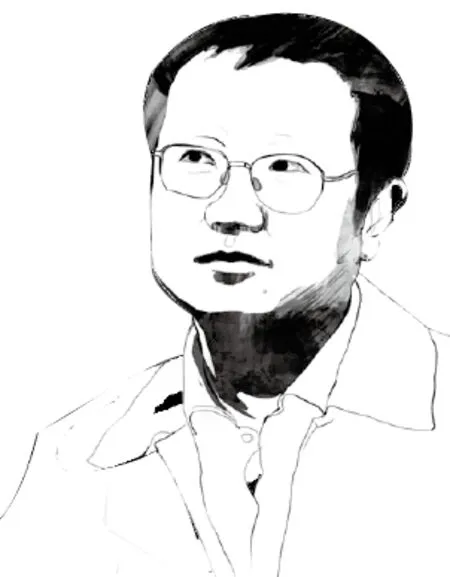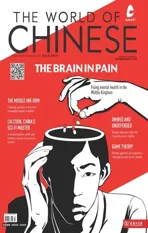lIU CIXIN, CHINA’S SCI-FI MASTER
2015-01-17
lIU CIXIN, CHINA’S SCI-FI MASTER

A conversation with the hottest name in science fiction
科幻小说在中国:专访“雨果奖”得主刘慈欣
THE SECOND BOOK OF THE THREE BODY TRILOGY, DARK FOREST, WAS PUBLISHED IN ENGLISH IN AUGUST AND LIKE THE FIRST BOOK, THREEBODY PROBLEM, THE HUGO AWARD WINNER, IT WAS QUITE POPULAR. WHY DO YOU THINK YOUR BOOKS HAVE BEEN SO POPULAR IN THE ENGLISH-SPEAKING WORLD?
To be honest, I didn’t expect the English edition to be popular in the US, which is the biggest country for science fiction and where the development of science fiction is mature. The development of science fiction in China has been interrupted many times since the first sci-fi works in the Qing Dynasty, and there has been no heritage or consistency, so China’s science fiction today is very immature. I was not confident that a Chinese work would be recognized by US readers. Now that my two books have been recognized by many US readers, I would attribute the popularity to both the excellence of the translation and the theme of Three Body, which brings up serious questions about humanity’s survival and the future of earth and the universe; those are universal concerns in good sci-fi, be it English or Chinese. Another reason is that, after many years of development, US science fiction went through a golden Age in the 1950s and then the New Wave in the 1960s, and today storytelling in US science fiction has become more advanced and refined, but at the same time the fiction is losing creativity and energy. Non-English fiction brings a completely different, refreshing air along with cultural differences. And, as China is developing and modernizing fast, the vitality and creative spirit embedded in Chinese science fiction is similar to those stories born in the golden Age. I think my storytelling somehow reminds many US readers of the books published in that golden Age.
YOU’VE SAID MANY TIMES THAT YOU WERE INFLUENCED A GREAT DEAL BY GOLDEN AGE WRITERS LIKE ARTHUR C. CLARKE AND ISAAC ASIMOV; YOU’VE EVEN SAID THAT YOU FELT LIKE CLARKE WAS “GAZING AT YOU” WHEN YOU WROTE. DO YOU STILL FEEL THIS WAY?
Recently I have not felt this way because I’m not writing; I’m still planning my next story in my head. But yes, the golden Age writers had a deep influence on me. I grew up reading Asimov and Clarke, which has shaped me in terms of a philosophy of writing science fiction, including how to define science fiction and distinguish it from other genres. I also learned about the relationship between hard science and fiction and how to build an imaginative story on science—that science fiction should be super-real but not supernatural. Scientific creativityis the core and plots and roles serve that idea. Writer george Orwell also affected me a great deal in terms of literary style; I tend to have an older style, using simpler words and direct expression. Leo Tolstoy’s“Soviet” style also influenced my writing.
WHAT IS THE DIFFERENCE BETWEEN CHINESE AND WESTERN SCIENCE FICTION?
There isn’t a unified “Chinese style” of science fiction. It is hard to define “Chinese science fiction” in one or two lines and it’s the same with“Western science fiction”. On the contrary, I think there are more similarities between Chinese and American science fiction than differences.
HOW DID YOU FEEL AFTER WINNING THE HUGO AWARD? IT’S BEEN FOUR YEARS SINCE YOU FINISHED THE THREE BODY SERIES AND SOME PEOPLE ARE WORRIED ABOUT THE PRESSURE YOU MIGHT FEEL FOR YOUR NEXT WORK. DO YOU THINK THE AWARD IS A BURDEN?
On the contrary, the Hugo Award has released all the pressure I had before. Even if I do not write a single word in the future, I have reached the apex of science fiction. So, currently I do not feel any pressure. I’m a successful science fiction writer, even if I don’t write anything ever again.
SOME MEDIA REPORTS HAVE SAID THAT YOU HAVE KILLED OFF A FEW PREVIOUS STORY IDEAS. CAN YOU TELL US MORE ABOUT THOSE IDEAS AND PERHAPS WHY YOU KILLED THEM?
As technology develops, science is not as mysterious or exciting as before, and traditional science fiction is harder to write. The mysterious atmosphere brought by unknown or unrealized science is what science fiction relies on—but this atmosphere is dissolving. I spent two years developing a story idea about human beings putting solar power batteries on the moon and sending back the power though microwaves. But, then I found a Japanese professor had raised a similar idea. So, I gave up. The world changes so fast and new ideas soon become old. The unprecedented scientific development speed could be fatal to some traditional fiction. I have no choice but to accept it.
YOU HAVE ALSO SPOKEN ABOUT STORY IDEAS FROM THINGS LIKE THE INTERNET AND ARTIFICIAL INTELLIGENCE. CAN THOSE THINGS BECOME INSPIRATIONS FOR YOU?
Not just the internet, every scientific area is developing fast and many stories can be generated. But those stories might not be able to attract or surprise readers like they could in the golden Age.
DO YOU HAVE A PLAN FOR YOU NEXT STORY?
I’m still thinking about it in my head.
YOU DON’T HAVE TO WRITE YOUR IDEAS DOWN?
No, I don’t have to write them down. I only start writing after the story is completed in my head. Although the power plant I used to work at has closed, I still don’t call myself a full-time writer. If I were to go to work at the new power plant in my city, it would take me too much time and I wouldn’t have time for writing. So far I haven’t figured out the next step yet.
YOU USED TO WRITE SOME BLOGS BUT HAVEN’T UPDATED THEM FOR A LONG TIME. HAVE YOU CONSIDERED OPENING A WECHAT ACCOUNT OR A SINA WEIBO ACCOUNT TO HAVE MORE CONTACT WITH YOUR READERS?
No. I don’t feel a strong will to communicate with readers. For a fiction writer, the best way to communicate with your readers is through your books and when my work reaches the readers, I’ve accomplished that communication.
DO YOU HAVE ANY HOBBIES?
When I was young I was a heavy computer game player, but later I quit and spent more time reading fiction and the latest science books. I also enjoyed traveling and watching movies, mostly scientific in nature.
DO YOU REMEMBER YOUR FIRST ATTEMPT AT WRITING SCIENCE FICTION?
I first started writing science stories in high school. Similar to Three Body, it was also a story about aliens invading Earth. I was very excited to write down my imagination, and I expected a reply [from a science publication] after I sent my story through. In the end, they did not publish my story, and I felt quite frustrated. This is common for a new writer. When I was in high school, I found that I could visualize and imagine many“big words” like the “speed of light”. For many people they only consider the speed being very fast, but for me, I feel the unbelievable speed and whatit can cause and I feel shocked to comprehend such words. But it’s not unique. I’m sure many fiction writers think that way.
THERE WAS A TIME WHEN CHINESE READERS COULDN’T GET ACCESS TO FOREIGN SCIENCE FICTION. WHAT DID YOU DO THEN?
At those times, I just didn’t read or write. After over a decade I restarted writing and the reason was because, after 1995, domestic science fiction was reborn.
WHAT ARE YOUR EXPECTATIONS FOR THE THREE BODY MOVIE?
I participated in the film-making process and assisted with conceptual design. I certainly hope the film will be welcomed by the public and recognized by professionals. But since China is quite inexperienced in making such science fiction movies, I don’t expect too much and will stay cool.
AFTER READING DARK FOREST, MANY PEOPLE THOUGHT THAT THE“DARK FOREST” THEORY SHOULD BE APPLIED TO THE REAL WORLD. WHAT DO YOU THINK ABOUT THAT?
When I was writing I thought this was just speculation and a possibility that has never been tested. I think this is for a different civilization, not for the people of Earth.
IN INTERNATIONAL RELATIONS STUDIES, THERE IS THE THEORY OF MUTUALLY ASSURED DESTRUCTION, APPLIED IN TERMS OF NUCLEAR WEAPONS. DO YOU THINK THIS IS SIMILAR TO THE “DARK FOREST”THEORY IN YOUR NOVEL?
History has proven that such a“deterrence” wasn’t real and problems were ultimately solved by human beings through rational negotiation and communication. Today, nuclear war is less likely to happen when compared to the situation last century. It also illustrates that, from another angle, the “Dark Forest” theory is not for human beings.
YOU SAID BEFORE THAT YOU THINK PEOPLE SHOULD CARE MORE ABOUT HUMAN SURVIVAL AND POTENTIAL DOOMSDAY AND OFTEN DISCUSS THE NECESSITY OF MORALITY WHEN THE EARTH IS IN DANGER. WILL YOU REPEAT THIS THEME IN YOUR FUTURE NOVELS?
Yes, possibly. It’s an eternal topic in science fiction and sci-fi writers often discuss this. I will keep bringing up this discussion on morality in my future stories, but from different angles and settings.
ALTHOUGH YOU DON’T THINK THE“DARK FOREST” THEORY SHOULD BE APPLIED TO HUMAN BEINGS, DO YOU THINK IT’S STILL IMPORTANT FOR PEOPLE, AFTER READING YOUR BOOKS, TO BE CONCERNED ABOUT INTERGALACTIC WAR?
I hope people will give more thought to potential apocalypses or super disasters, which are issues human civilization should confront as a whole. Although we do see signs of apocalypse, we should be prepared for the danger from different perspectives: politics, the economy, ethics. For many people, there are no answers there, and only science fiction writers are discussing such questions.
SOME PEOPLE, “SURVIVALISTS”, ARE WELL-EQUIPPED FOR THE END OF THE WORLD. DO YOU CONSIDER YOURSELF ONE OF THEM?
No, I’m not one of them. I think
it is the whole human race that should have certain expectations about the possibility for super disasters. But, I don’t think individuals need to stay alert all the time for doomsday.
DO YOU HAVE ANY EXPECTATIONS FOR YOUR READERS AND THE WRITERS OF THE YOUNGER GENERATION?
I have said before that I would feel a sense of achievement if someone would stop while walking home to look at the stars, even if it’s just for a moment. I still think this way. I’m looking forward to writing something that makes me excited and encourages more readers to read it. I hope young writers will write something that’s influential, and they need to take readers’ preferences into consideration, rather than just thinking about their own interests, in order to write something that’s widely influential rather than just popular in a small circle.
- llU SHA 〔刘莎〕
Liu Cixin, 52, one of the most popular science fiction writers in China, recently won the Hugo Award for the first book in his Three Body trilogy, Three-Body Problem. He grew up in a small city in China’s coal province of Shanxi and worked as an engineer for years at an electric power plant, writing novels as his part-time hobby. Despite the sudden literary fame, he has maintained a simple lifestyle.
